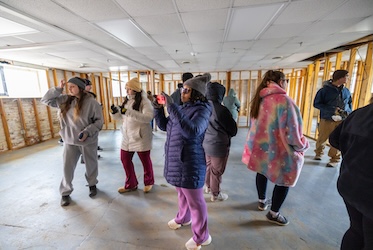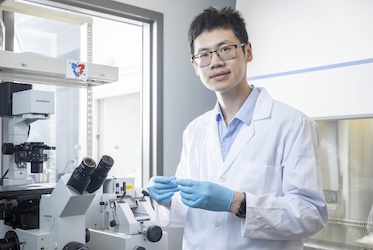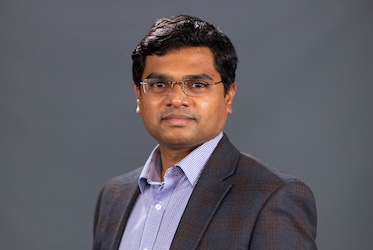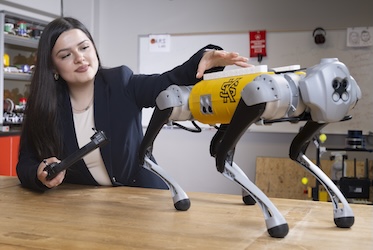
Kennesaw State professors awarded NIH grant to improve children’s oral health
KENNESAW, Ga. | Apr 28, 2022
Faculty and students in Kennesaw State’s Southern Polytechnic College of Engineering and Engineering Technology (SPCEET) are doing research that will lead to better oral health for children, by studying fluoride varnish applications.
“I’ve always been passionate about doing research that helps society,” said principal investigator and department chair of industrial and systems engineering (ISYE) Christina Scherrer. “I’m excited to involve Kennesaw State students on this project which will positively impact children in our area.”

Scherrer was recently awarded a three-year, $424,000 grant from the National Institutes of Health (NIH), along with co-principal investigators Robert Keyser, ISYE faculty member at Kennesaw State, and Shillpa Naavaal from Virginia Commonwealth University's School of Dentistry, to assess and reduce barriers associated with primary care doctors applying fluoride varnish on children’s teeth. It is the first NIH grant to be awarded directly to the college.
Fluoride varnish is a dental treatment that reduces decay, can be applied on primary teeth and permanent teeth, and has the potential to dramatically improve oral health. Insurance in every state will pay for pediatricians to apply the fluoride varnish, but Scherrer says not very many do, citing concerns about the time it takes and cost-effectiveness.
“Children under the age of three, especially from low-income populations, may not visit a dentist,” said Scherrer, who has also worked with the CDC on oral health research. “However, most will visit their pediatrician annually for a well-visit, which makes it an ideal opportunity to receive fluoride varnish.”

The faculty members, along with several undergraduate student researchers, will partner with pediatric clinics in Georgia that are applying the fluoride varnish to study their practice. The long-term goal is to increase access to, and use of, fluoride varnish in non-dental settings to reduce disparities in children’s oral health.
“We know that it will have a positive impact on children’s teeth if we can make it easier for more pediatricians to add fluoride varnish application to well-visits for young children,” said Scherrer.
Keyser, who has an expertise in time-study, will take teams of students to clinics that are applying fluoride varnish and will videotape the application process. They plan to take more than 100 videos, which will later be broken down and analyzed. The time studies will determine how long each step takes, from the child sitting down in the office, to the preparation of supplies, the application process and the paperwork processing time.
This analysis will result in documenting best practices to share with other pediatricians who are hesitant to incorporate the important preventive oral treatment. Keyser is excited to work with Scherrer and the students on a project that will have many positive implications.
“The students get excited about being involved in something that not only will come with a journal publication, but will also be real research that benefits humanity,” Keyser said. “This is a contribution on our part to help children and their parents.”
Keyser and Scherrer are currently recruiting students to join their research team and hope to start site visits in the summer.
“I am amazed at how our faculty continue to lead cutting-edge research that transforms the world around us,” SPCEET Dean Ian Ferguson said. “This award showcases the unique applications for future engineers, and our students will greatly benefit from the opportunity to participate in this research.”
– Abbey O’Brien Barrows
Photos by David Caselli
Related Stories

Kennesaw State architecture, engineering students reimagine Asheville's devastated River Arts District

KSU researcher harnessing digital twin technology to improve heart care

Kennesaw State University researcher, students explore clean energy storage solutions

Kennesaw State student exploring the use of robotics in agriculture
A leader in innovative teaching and learning, Kennesaw State University offers undergraduate, graduate, and doctoral degrees to its more than 47,000 students. Kennesaw State is a member of the University System of Georgia with 11 academic colleges. The university’s vibrant campus culture, diverse population, strong global ties, and entrepreneurial spirit draw students from throughout the country and the world. Kennesaw State is a Carnegie-designated doctoral research institution (R2), placing it among an elite group of only 8 percent of U.S. colleges and universities with an R1 or R2 status. For more information, visit kennesaw.edu.















